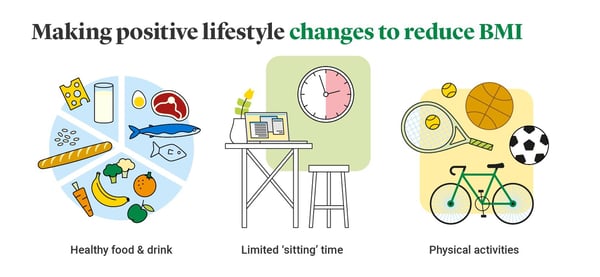Life insurance with a high BMI
According to a report by Gov.uk in May 2024, 64% of adults over 18 were estimated to be overweight or living with obesity. If this definition applies to you, is it still possible to get life insurance? In this guide we examine what BMI (Body Mass Index) means, and what a high (and low) score could mean if you're thinking about financial protection.

The history of BMI
BMI was originally created by Belgian mathematician Adolphe Quetelet in 1832 as a way of measuring the human body by weight relative to height. In 1972, the term Body Mass Index was coined by physiologist Ancel Keys, drawing upon Quetelet’s original research. In the late 1990s, the World Health Organisation adopted and refined the standard BMI criteria that we still use today.

How much does BMI affect life insurance?
When customers get a life insurance quote, we assume they're in typical health for their age. Someone with high BMI – or a low BMI – has a greater chance of developing health related issues. This means the cost of protection can be higher.
- Life insurance with a high BMI. If you’re overweight (BMI of 25 to 29.9) or obese (BMI of 30 and above), you can expect to pay more than a typical customer. It's possible that we won't be able to cover you. Your health risks include heart disease and certain cancers.
- Life insurance with a low BMI. If you’re underweight [WT1] (BMI below 18.5), your life insurance could be more expensive. Health problems associated with being underweight include bone fractures and a weak immune system.
- Life insurance with a healthy BMI. A healthy BMI score (18.5 to 24.9) doesn’t increase or decrease the cost of life insurance. Of course, insurers take other health and lifestyle factors into account.
What is the difference between ‘overweight’ and ‘obese’?
According to the World Health Organisation, someone who is overweight has excessive fat, whereas an obese person has a “chronic complex disease defined by excessive fat deposits”. Consequently, an obese person will have a higher BMI score than someone who is overweight.
What is the BMI limit for life insurance?
It’s unlikely that you will be able to take out life insurance if you have a BMI score of 40 or above. However, every individual has different circumstances when they apply, so can give you more information when you apply.
Health conditions linked to a high BMI
As we’ve covered, being overweight can undoubtedly have an impact on your life insurance premiums. That’s because a high BMI is linked to a range of health conditions, such as:
- Type 2 diabetes
- Coronary heart disease
- Stroke
- Bowel cancer
- Depression
Life insurance can help protect your family financially if you were to pass away while covered by the policy. When taking out life insurance, you'll have the option to add Critical Illness Cover for an additional cost. Many conditions, such as stroke, heart disease and some cancers are covered by Legal & General’s Critical Illness Cover. It provides some extra reassurance that your family could be financially protected if you became critically unwell. BMI can affect the cost and availability of critical illness cover.
The limitations of BMI
A BMI score has “some limitations”, according to the NHS. BMI is a measurement of weight, rather than body fat, so it doesn’t give the full picture of a person’s general health. For example, a fit and healthy person with a high muscle mass might be recorded as ‘obese’ due to a high BMI score.
Is BMI still important?
Some researchers and health professionals argue that BMI is becoming less important as a measurement of obesity. A 2025 report published in The Lancet argued for “other measurements of body size (waist circumference, waist-to-hip ratio, or waist-to-height ratio), in addition to BMI, to define obesity status”.
But while the debate around BMI will continue, it’s worth remembering that a life insurance provider does not solely rely on a BMI score when assessing an application.
Beyond BMI: other health factors that affect life insurance
While it’s useful for life insurance providers to know if an applicant has a high BMI, there are other health factors that will determine the cost – and availability – of a policy. This includes:
- Your smoker status
- Your alcohol intake
- Any recreational drug use
- Your mental health
- Your family medical history
Resources to help with losing weight

Losing weight and eating well can be a boost to anyone’s physical and mental health. If you’d like to read more on this topic, here are some useful online resources.
- The NHS Weight Loss Plan is available as a free download. It recommends various activities that can help with weight loss, such as setting weight goals, planning healthy meals and burning calories through exercise.
- The British Heart Foundation publish online weight loss guides and tips.
- Charities like Diabetes UK offer online guidance on weight loss.
Want to learn more about Life Insurance?

Life insurance with pre-existing medical conditions

Can you get life insurance with no medical?

